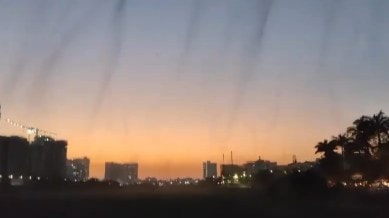Click here to join Express Pune WhatsApp channel and get a curated list of our stories
‘Mosquito tornadoes’ in Pune: Such insect swarms not unusual, need to address root cause of untreated sewage, says expert
Retired zoology professor Dr Hemant Ghate says the insects seen in the tornado-like formations in Pune are not mosquitoes but belong to a family called Chironomidae and do not bite.

Videos of large swarms of tiny, mosquito-like insects that appear to form a ‘tornado’ in some areas in Pune have led to much concern over the last few days. Experts say that the phenomenon itself is not unusual and that they are not mosquitoes but belong to the insect family called Chironomidae.
“This is not an unusual phenomenon,” retired zoology professor Dr Hemant Ghate told The Indian Express, adding that untreated sewage is the root cause of the problem which is not being addressed. “Their larvae are like mosquito larvae but red due to the haemoglobin in their blood. These insects are abundant in waters polluted with organic matter and are present everywhere on the Mula-Mutha river.”
monthly limit of free stories.
with an Express account.
Dr Ghate said the pupae (stage between larva and adult) of these insects evolve into adults at appropriate warm temperatures and hence a large number of mosquito-like adults emerge as swarms. “As a large number of adults fly above the water, their swarms sway in gentle wind, looking like waves. These do not bite but their abundance suggests sewage-polluted waters,” he explained.
Organic matter is food for their larvae, whereas the adults are short-lived and die soon after laying eggs in water, the retired professor added.
“The larvae are abundant in water and one can see this at Sambhaji bridge also. These larvae feed on organic sewage matter. It gets washed away during monsoon. On a still day with no wind, the swarms appear as a plume of smoke coming from trees or buildings near the river,” he said, while pointing out that untreated sewage also produces phosphorus and nitrogen, allowing the growth of hyacinth.
Click here to join Express Pune WhatsApp channel and get a curated list of our stories